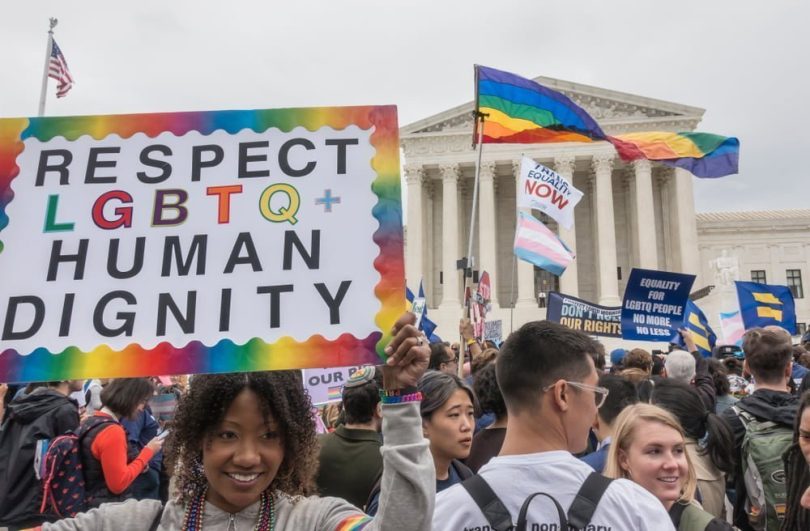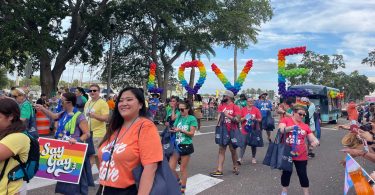In 1955, the Pennsylvania Human Relations Act went into effect to protect citizens from discrimination in the areas of employment, housing, education and public accommodations. While the Act was an important step forward, the vague language, particularly as pertains to the word “sex,” offered no real protection for the LGBTQ community.
Without any kind of statewide protection, only people who lived in a municipality or a city that had enacted specific ordinances had any legal recourse if they were subjected to discrimination based on their sexual orientation or gender identification. Since only about half of the state had any protections in place (often enforced by understaffed municipalities), the majority of LGBTQ people in PA were left unprotected. Here in Bucks County, 5 Boroughs and 3 townships adopted anti-discrimination ordinances to close the loophole in state and federal law that did not cover LGBTQ rights.
In 2021, the Fairness Act was introduced, which would have enshrined civil rights for ALL Pennsylvanians into our state constitution. The Amendment passed in the House and moved on to the Republican Senate, where it was blocked.
READ: Today, Tomorrow, and Yesterday as a Transgender Youth – in Bucks County and Across the Country
But the fight for LGBTQ rights in Pennsylvania did not end there. Joel Bolstein, chairperson of the Pennsylvania Human Relations Commission, saw an opportunity for real change.
“In 2020, the US Supreme Court came out with a decision in the Bostock case that said when you discriminate against somebody because of their sexual orientation, you’re discriminating against them because of their sex. So, since the federal government through the US Supreme Court was now interpreting the word ‘sex’ to include sexual orientation for employment, we decided that well, if the federal government is expressing a more expansive reading of that protected class for employment, this protection has to be for everything that we handle under the Human Relations Act in Pennsylvania,” Bolstein said. “So we came out with a proposed regulation that would do just that.”
While LGBTQ rights are often fodder for inflammatory political battles, Bolstein is adamant that the PHRC is not a partisan agency. “There are 11 commissioners allowed and no more than six can be from the same political party, but I don’t even know what political party people are from because the issues never get discussed in that fashion. You’ll never hear somebody saying, ‘well, the Republican position is this…’ That shouldn’t even be relevant for our work. I see this as a human issue, and an issue where everybody is entitled to be protected. We intend to enforce the new regulations vigorously and liberally to make sure that the discrimination ends.”
The issue of protecting marginalized communities is very personal to Bolstein, whose daughter is in a same sex marriage.
“My daughter grew up in Bucks County, went to college in Lancaster County, and then promptly upon graduating in 2014, moved to New York state, saying she didn’t want to live in a state that wouldn’t protect gay people from discrimination. So I thought, ‘well, we have a chance to do something about that.’”
After an extensive process, the regulations became final in a 3 to 2 vote last August, meaning that Pennslyvanians now have free legal recourse against discrimination based on sexual orientation or gender identification.
Shortly after the passage of the new regulations, Planned Parenthood Keystone’s the Rainbow Room partnered with the William Way LGBT Community Center and several other area civil rights organizations to host a Community Town Hall, which featured Bolstein. Marlene Pray, Director of the Rainbow Room, Bucks County’s center for LGBTQ+ youth since 2002, said that the response from the Rainbow Room youth, their parents, and community members was a mixture of relief, gratitude and eagerness to get this new information out to the public, for those in need of protections, and a message to the community that those who discriminate can and will be held accountable.
“The new PHRC regulations protecting LGBTQ+ people from discrimination address an unfortunate and deeply significant need here in Bucks County and across PA. These new regulations are a game changer – for now,” said Pray. “It means that if you are a queer person and discriminated against because of that – whether fired from a job, denied services at a restaurant or at a medical facility, or face discriminatory treatment in a public school – there is now a complaint process with real teeth to address these civil rights violations. It sends a message to queer youth that protections exist, and that people care about you. This is so critical, at a time when harmful and punitive attacks have escalated targeting our amazing LGBTQ+ youth.”
L-R: The Rainbow Room’s Marlene Pray, Anti-Defamation League’s Andrew Goretsky, and PA HRC’s Joel Bolstein.
She noted, however, that advocacy and awareness are still essential because the regulations are still vulnerable to potential administrative changes in Harrisburg.
“We need to continue creating a more inclusive, welcoming and safe community for the diverse spectrum of humanity that we represent, but given that discrimination and attacks against LGBTQ+ people have escalated in the past few years, regulations like this are vital,” Pray added.
Joe Khan, former Bucks County solicitor and current candidate for PA Attorney General, was pleased to see the new regulations put in place.
“In Central Bucks, we fought throughout 2023 to keep our kids safe from extremists spewing anti-LGBTQ+ hate,” said Khan, who was targeted by the Moms for Liberty for supporting families at the Rainbow Room. “As we begin a new year I am glad to see more being done to keep our LGBTQ+ community safe.”
Bolstein explained that under the new regulation, those who file discrimination complaints will be provided with an attorney, free of charge. There are close to 100 paid professional staff working with the PHRC. When complaints get filed, they’re investigated, and, if probable cause is found, there’s an effort to try and conciliate or settle the case. If a settlement isn’t reached, the case goes before the commissioners.
Bolstein says that nearly 100 cases have already been filed since the regulation was made official in August.
“We had a case not that long ago, very similar to Bostock, where an employee was invited to a holiday party. You were allowed to bring your spouse or significant other, and they brought their same sex spouse, and then they were fired. They filed a complaint with PHRC and we were able to get them a $250,000 settlement.”
READ: How The Welcome Project PA Provides A Space For LGBTQ+ People To Build Community
Beyond protection of the LGBTQ community, the new regulations also revise the definition of racial discrimination to include hairstyles. Bolstein explained that the expanded definition would make it illegal for schools or businesses to forbid particular hairstyles such as dreadlocks.
While the new regulations offer expanded protections, Bolstein is concerned that many are still unaware of their expanded Rights.
“We’re hoping that once people realize that the state laws are there, not only would they understand that they have a right to file a complaint, but that hopefully, employers, apartment managers, lenders, school districts, all of the entities that are subject to the Human Relations Act will change their policies if they need to so that there isn’t any discrimination,” said Bolstein.
Through the work of the PHRC, millions of Pennsylvanians will now have legal protection to live, work, and learn free of discrimination. And after being a commissioner on the PHRC for 25 years, Bolstein said this accomplishment is what he is most proud of.
“This gives us the ability not only to help an individual by investigating their complaint and giving them a remedy, but to help a whole class of people. I’m hoping that reporters stop saying Pennsylvania is one of the few states that doesn’t have statewide protection, because we do now,” said Bolstein. “Regulations have the force of law. We were fully supportive of the efforts to enact it on a statewide level as a statute. But until that time, we’re going to do what we need to do to make sure that everybody’s protected.”
Here is the PA HRC link to file a complaint for discrimination: https://www.phrc.pa.gov/Complaints/Pages/How-to-File-a-Complaint.aspx
Bucks County residents interested in learning more about the proposed Pennsylvania Fairness Act and how it would solidify LGBTQ Rights in the state are invited to attend the Human Rights Campaign’s education event in New Hope on Thursday, January 25 at 6 pm. RSVP here to attend: https://attend.events/3Uo8a8r?q=Myh2bB9N3e







